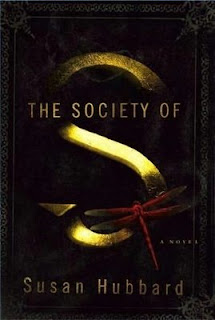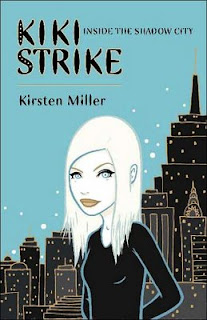
Author: Susan Hubbard
Publisher (In Great Britain): Walker Books Ltd
Publication Year (In Great Britain): 2008
Most of the readers will be: Middle school and early high school girls.
Reader's Advisory: If you like vampires, you should probably read Twilight by Stephenie Meyer. It's so hot right now. Or, you could read my favorite vampire book, Sisters of the Night, edited by Barbara Hambly and Martin Harry Greenberg (this is a collection of short stories).
Summary:
Ariella has grown up with her father in a large Victorian house in Sarasota Springs, New York. She is home schooled and very sheltered. The housekeeper, Mrs. McGarritt, convinces Ari's father to let her spend time with her children. Ari becomes close with Mrs. McG's daughter, Kathleen, and her son, Michael.
Once Ari sees how other people live she realizes how strange her own life is. She has many new questions for her father during their afternoon classes. Most of them are questions he doesn't want to answer.
After Kathleen is murdered, Ari's father begins to tell her the truth about who they both are and what has happened to Ari's mother. In a deep depression, Ari hitchhikes south in search of her mother and the missing pieces she needs to complete the puzzle.
My favorite passage:
I forced myself to read a collection of poetry by Edgar Allan Poe, and it was tough going. I'd suffered through The Narrative of Arthur Gordon Pym, which seemed to me painfully overwritten. But the poetry was even worse. In an hour my father would be upstairs, expecting me to have insights into meter and rhyme, and all I could think about was that Michael (and Kathleen) were out shopping, and that I wouldn't see them at all that day.
Mrs. McG had made me an omelet for lunch, so watery and tasteless that I couldn't make myself eat more than a few bites of it. I wondered why her cooking tasted so much better at her house.
When I met my father in the library at one, I said, "You know, I don't think much of Poe's poetry."
He was sitting at the desk, and one of his eyebrows lifted. "And how much of it have you read, Ariella?"
"Enough to know that I don't like it." I talked quickly, to hide the truth: I'd read the first and last stanzas and skimmed the rest. I tried to explain. "The words are just ... words on the page."
"Which one were you reading?" How like him, to know I'd read only one.
I opened the book and handed it to him. "'Annabel Lee,'" he said, his voice caressing the name. "Oh, Ari. I don't think you've read it at all."
And he read the poem aloud to me, barely glancing at the book, never pausing between the lines or stanzas, and the words were like music, the saddest song in the world. When he read the final lines ("And so, all the night-tide, I lie down by the side / Of my darling–my darling–my life and my bride / In her sepulchre there by the sea– / In her tomb by the sounding sea."), I was crying. And when he looked up from the book, I saw tears in his eyes.
He recovered quickly. "I'm sorry," he said. "Poe was a bad choice."
But I couldn't stop crying. Embarrassed, I left him and went upstairs, lines of the poem still sounding in my head: "For the moon never beams, without bringing me dreams / Of the beautiful ANNABEL LEE; / And the stars never rise, but I feel the bright eyes / Of the beautiful ANNABEL LEE."
I fell onto my bed and cried as I'd never cried before–for my mother and father and me, and all that we'd been and might have been, and all that had been lost. (pg 54-55)
What I really think:
After reading a book which so heavily features Whitman (not my favorite poet) you can imagine what a pleasant surprise it was to find that this book features Poe (quite possibly my favorite poet).
I like Ari's voice. She sounds like a very intelligent child. Not too intelligent to be believable. It's just right. The way she sometimes talks directly to the reader reminds me of Jane Eyre.
So, Poe references and a strong voice, what's not to love? Um, I wasn't crazy about the vampire business. It's not that I don't like vampires, it's just that I like to see an individual author's "world that contains vampires" be really unique. Tell me something I don't already know. Make me feel something about vampires I don't already feel. Yeah, Hubbard's rules for vampires are a little different from the traditional, but I wasn't totally sold. It felt kind of like a regualr coming of age story with vampirism thrown in to get teens to read it. (Because vampires are so hot right now.)
I remained interested throughout the book, but was well and truly disappointed by the Epilogue. It reminds me of the ending of Stacy (this movie is the reason I'm no longer allowed to pick movies when hanging out with friends). Ari hopes for a future in which humans and vampires openly share the world with one another. Gag.






